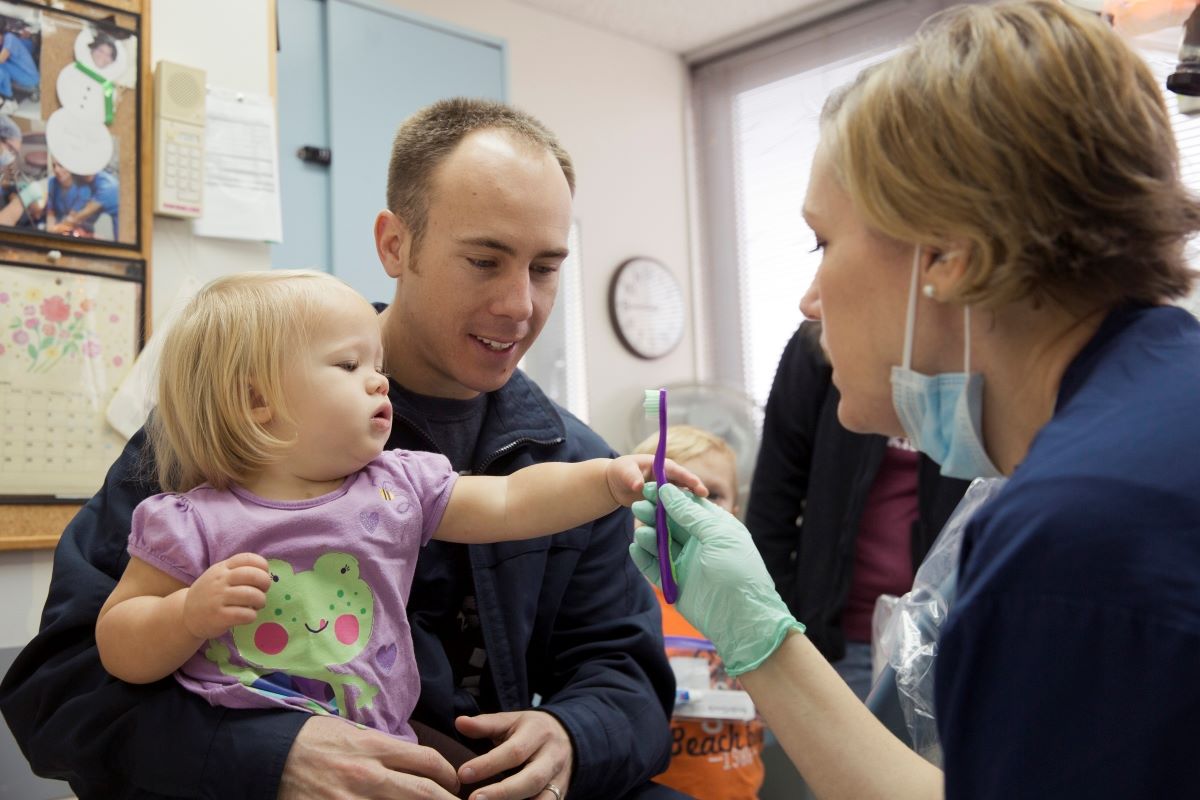

Finance
When To Get Dental Insurance For A Baby
Modified: December 30, 2023
Looking for dental insurance for your baby? Find out when is the best time to get dental coverage to ease the financial burden and ensure their oral health right from the start.
(Many of the links in this article redirect to a specific reviewed product. Your purchase of these products through affiliate links helps to generate commission for LiveWell, at no extra cost. Learn more)
Table of Contents
Introduction
When it comes to ensuring the health and well-being of our little ones, dental care is often overlooked. However, dental health is essential for babies, as proper oral hygiene at an early age sets the foundation for a lifetime of healthy teeth and gums. One way to prioritize dental care for your baby is to consider dental insurance.
Dental insurance for babies may not be a widely discussed topic, but it can be incredibly beneficial in terms of cost-saving and promoting preventive care. This article will provide an overview of the benefits of dental insurance for babies, factors to consider when getting dental insurance for your little one, common dental issues in babies, the importance of early dental care, and when it’s the right time to start dental insurance for your baby. Additionally, we will discuss how to choose the right dental insurance plan to suit the needs of your little one.
Ensuring that your baby receives proper dental care from an early age is crucial. Dental issues in babies can not only cause discomfort, but they can also impact their overall health and development. By having dental insurance, you can have peace of mind knowing that you have a financial safety net in case unexpected dental problems arise.
It’s never too early to start caring for your baby’s oral health. By being proactive and investing in dental insurance for your baby, you can provide them with the best chance for a lifetime of healthy smiles. So, let’s delve into the specifics of dental insurance for babies and learn how you can give your little one the gift of good dental health from the start.
Benefits of Dental Insurance for Babies
Dental insurance for babies offers a range of benefits that can greatly contribute to their overall dental health and well-being. Here are some key advantages of having dental insurance for your little one:
- Cost Savings: Dental procedures, even for babies, can be expensive. Dental insurance helps alleviate the financial burden by covering a significant portion of the costs. It can include preventive services like regular check-ups, cleanings, and X-rays, as well as restorative treatments such as fillings or extractions if needed.
- Access to Preventive Care: Dental insurance typically covers preventive services, which are vital for maintaining good oral health. Regular check-ups allow the dentist to monitor the baby’s dental development and spot any potential issues early on. This can prevent more serious dental problems in the future, saving both money and discomfort.
- Early Detection of Dental Problems: Dental insurance encourages parents to take their babies for regular check-ups, ensuring that any dental issues are identified at an early stage. Early diagnosis means prompt treatment, which can prevent complications and reduce the need for more extensive and costly procedures later on.
- Peace of Mind: Knowing that your baby is covered by dental insurance can bring peace of mind. Dental emergencies can happen unexpectedly, and having insurance can provide financial security in such situations.
- Education and Resources: Some dental insurance plans offer educational resources for parents, including tips on proper oral hygiene and information on age-appropriate dental care. These resources can empower parents to take an active role in their baby’s dental health and establish good habits from an early age.
By providing access to essential dental care, cost savings, early detection of problems, and valuable educational resources, dental insurance for babies is a valuable investment in their overall health. It offers peace of mind for parents and contributes to the long-term well-being of their little ones.
Factors to Consider when Getting Dental Insurance for a Baby
Choosing the right dental insurance for your baby is an important decision that requires careful consideration. Here are some key factors to keep in mind when selecting dental insurance for your little one:
- Coverage and Benefits: Review the coverage details and benefits offered by different dental insurance plans. Ensure that preventive services such as regular check-ups, cleanings, and X-rays are included. Also, consider the coverage for restorative treatments like fillings or extractions, in case they are needed in the future.
- Network of Dentists: Check if the dental insurance plan has a network of dentists in your area. It is important to have convenient access to a dental provider who specializes in pediatric dentistry and has experience in treating babies and young children.
- Costs and Premiums: Evaluate the costs associated with the dental insurance plan, including premiums, deductibles, and co-pays. Compare different plans to find one that aligns with your budget while providing comprehensive coverage for your baby’s dental needs.
- Waiting Period: Some dental insurance plans may have a waiting period before certain services are covered. Consider the waiting period for various treatments, especially if your baby already requires immediate dental care.
- Out-of-Network Coverage: Find out if the dental insurance plan provides coverage for out-of-network dental services. This can be important in case you need to visit a specialist or if there are limited options within the network.
- Customer Service and Support: Research the reputation of the dental insurance provider regarding customer service and support. It is essential to have responsive and helpful assistance when dealing with claims, inquiries, or any issues that may arise.
- Familiarize Yourself with the Plan: Take the time to thoroughly read and understand the terms and conditions of the dental insurance plan. Pay attention to any limitations, exclusions, or waiting periods that may impact the coverage for your baby’s dental treatments.
By considering these factors, you can make an informed decision when choosing dental insurance for your baby. Remember, every baby’s dental needs are different, so it is important to select a plan that provides comprehensive coverage and meets the specific requirements of your little one.
Common Dental Issues in Babies
While babies may not have a full set of teeth yet, they can still experience dental issues that require attention. Understanding these common dental problems can help parents be proactive in providing proper care. Here are some common dental issues in babies:
- Tooth Decay: Baby teeth are susceptible to tooth decay, also known as dental caries or cavities. This can occur due to factors like prolonged exposure to sugary drinks in bottles or poor oral hygiene practices. Tooth decay in baby teeth can lead to pain, infection, and affect the alignment of permanent teeth.
- Gum Inflammation: Inflamed or swollen gums, also called gingivitis, can occur in babies. This can be caused by factors like teething, poor oral hygiene, or bacterial infection. It is essential to keep the gums clean to prevent gum disease and promote healthy gum tissue development.
- Thumb Sucking: While thumb sucking is a natural reflex for babies, prolonged and intense thumb sucking can affect the development of their dental alignment. It can lead to problems like an open bite, protruding front teeth, or misaligned jaw growth. Parents should monitor thumb sucking habits and encourage them to stop as the child gets older.
- Tongue Thrusting: Some babies have a habit of pushing their tongue against their teeth or the roof of their mouth. This can disrupt the proper alignment and development of the teeth. If tongue thrusting persists as the baby grows, it may require intervention from a dental professional.
- Tongue-Tie: A condition called tongue-tie, or ankyloglossia, occurs when the frenulum (the tissue that connects the tongue to the floor of the mouth) is too short or tight. This can cause difficulties with breastfeeding, speech, and proper oral hygiene. In severe cases, it may require a minor surgical procedure to correct.
- Teething Discomfort: Teething is a natural process during which infants develop their first set of teeth. However, it can be uncomfortable for babies and lead to irritability, drooling, and gum swelling. Providing appropriate teething aids, such as teething rings or chilled washcloths, can help alleviate discomfort.
It is important for parents to be aware of these common dental issues in babies and to seek professional dental care when necessary. Regular dental check-ups, good oral hygiene practices, and early intervention can help prevent and address these issues, ensuring a healthy start for your baby’s dental health.
Importance of Early Dental Care
Early dental care is crucial for the overall health and development of babies. Establishing a dental routine from an early age sets the foundation for a lifetime of good oral hygiene habits. Here are several reasons why early dental care is important:
- Prevention of Dental Problems: Regular dental check-ups allow dentists to monitor the development of the baby’s teeth and gums. They can identify any potential issues or early signs of tooth decay, gum disease, or improper alignment. Early detection enables prompt treatment, preventing the progression of dental problems and the need for more extensive interventions.
- Establishing Good Oral Hygiene Habits: Introducing dental care early on teaches babies the importance of proper oral hygiene. Parents can start by gently cleaning their baby’s gums with a soft cloth or silicone finger brush even before the first tooth erupts. As the baby’s teeth come in, they can be brushed with an infant toothbrush and a non-fluoridated toothpaste suitable for their age.
- Preventing Tooth Decay: Baby teeth are susceptible to tooth decay, which can cause pain, infection, and affect the development of permanent teeth. Early dental care includes regular cleanings and fluoride treatments that help protect against tooth decay and strengthen the enamel of the baby’s teeth.
- Monitoring Facial Growth and Development: Dentists play a vital role in monitoring the facial growth and development of babies. They can identify and address any issues related to the jaw, eruption pattern of teeth, and bite alignment. Early intervention can help prevent more extensive orthodontic treatment in the future.
- Education and Guidance for Parents: Early dental care appointments provide an opportunity for parents to learn about proper oral hygiene techniques, appropriate nutrition for dental health, and strategies to manage habits like thumb sucking. Dental professionals can offer guidance and answer any questions parents may have regarding their baby’s dental care.
- Promoting Overall Health: Dental health is interconnected with overall health. Poor dental hygiene and untreated dental problems in babies can lead to pain, difficulty chewing, and poor nutrition. Additionally, studies have linked oral health to systemic diseases such as diabetes and cardiovascular disease, highlighting the importance of early dental care for long-term overall well-being.
By prioritizing early dental care, parents can ensure that their baby starts on the right path towards optimal oral health. Establishing good habits, preventing dental problems, and promoting overall well-being are the key benefits of early dental care for babies.
When to Start Dental Insurance for a Baby
It is recommended to start dental insurance for a baby as early as possible. While dental insurance may not be a top priority for many parents when their baby is born, it is important to consider enrolling in a dental insurance plan to ensure comprehensive coverage from the very beginning. Here are some factors to consider:
- Timing of the First Dental Visit: The American Academy of Pediatric Dentistry recommends that a child’s first dental visit should occur within six months after their first tooth erupts or by their first birthday, whichever comes first. By having dental insurance in place, you can ensure that the costs associated with this early visit and subsequent preventive care are covered.
- Preventive Care and Early Intervention: Dental insurance provides coverage for preventive services such as regular check-ups, cleanings, and X-rays. By starting dental insurance early, you can take advantage of these services to monitor your baby’s dental health, prevent issues before they worsen, and address any concerns at the earliest stage.
- Financial Protection: Unexpected dental problems can arise at any time, even in babies. By having dental insurance from the beginning, you have financial protection in case of emergency treatments or unforeseen dental issues that may require costly procedures or specialists.
- Building a Dental Care Routine: Starting dental insurance early for your baby helps establish a dental care routine and enhances the importance of regular dental visits. It normalizes and reinforces the idea of dental care as an integral part of overall health from a young age.
- Waiting Period Consideration: Some dental insurance plans may have waiting periods before certain services are covered. By enrolling in dental insurance early, you can serve the waiting period and have access to comprehensive coverage by the time your baby needs it.
To ensure optimal dental health for your baby, it is recommended to start dental insurance coverage as soon as possible. By doing so, you can provide your little one with access to preventive care, early intervention, financial protection, and the opportunity to establish a lifelong dental care routine.
Choosing the Right Dental Insurance Plan
Choosing the right dental insurance plan for your baby is crucial to ensure comprehensive coverage and meet their specific dental needs. Here are some key considerations to help you select the right dental insurance plan:
- Coverage for Pediatric Dental Care: Ensure that the dental insurance plan you choose includes coverage specifically for pediatric dental care. This ensures that your baby’s unique dental needs, such as preventive services, fluoride treatments, and early intervention, are covered.
- In-Network Dentists: Check if the dental insurance plan has a network of dentists in your area who specialize in pediatric dental care. Having access to experienced dentists who are familiar with treating babies and young children is essential for their comfort and overall dental health.
- Costs and Affordability: Evaluate the costs associated with the dental insurance plan, including monthly premiums, deductibles, and co-pays. Consider your budget and choose a plan that provides comprehensive coverage while remaining affordable for your family’s financial situation.
- Coverage for Preventive Care: Look for a dental insurance plan that covers preventive services like regular check-ups, cleanings, and X-rays, as these are crucial for maintaining good oral health and preventing dental problems.
- Coverage for Restorative Treatments: Consider the coverage provided for restorative treatments, such as fillings or extractions, in case your baby requires them. It is important to have adequate coverage for any potential treatment needs that may arise.
- Customer Reviews and Reputation: Research the reputation of the dental insurance provider and read customer reviews to gauge their reliability and level of customer satisfaction. A reputable provider with positive reviews is more likely to offer quality coverage and excellent customer service.
- Flexibility and Additional Benefits: Some dental insurance plans may offer additional benefits like coverage for orthodontics or cosmetic procedures. Consider if these additional benefits are important to you and your baby’s long-term dental needs.
- Flexibility for Out-of-Network Options: Find out if the dental insurance plan provides coverage for out-of-network dental services. This can be beneficial if you prefer to see a specific dentist or if there are limited options within the network.
- Customer Service and Support: Look for a dental insurance provider that offers reliable customer service and support. It is important to have responsive assistance when it comes to questions, claims, or any issues that may arise.
By considering these factors and carefully reviewing the details of different dental insurance plans, you can choose the one that provides the most comprehensive coverage, aligns with your budget, and meets your baby’s unique dental needs. Remember, selecting the right dental insurance plan sets the stage for a lifetime of healthy smiles for your little one.
Conclusion
Investing in dental insurance for your baby is a proactive step towards ensuring their oral health and well-being. By starting dental insurance early, you can provide comprehensive coverage for preventive care, catch any potential dental issues early on, and have the financial protection necessary for unexpected dental problems.
Babies are prone to common dental issues such as tooth decay, gum inflammation, thumb sucking, and teething discomfort. Early dental care not only prevents these issues but also establishes good oral hygiene habits, promotes proper facial growth and development, and contributes to their overall health.
When selecting a dental insurance plan for your baby, consider factors like coverage for pediatric dental care, in-network dentists specializing in pediatric dentistry, costs, coverage for preventive and restorative treatments, customer reviews, additional benefits, and customer service and support. By choosing the right plan, you can provide the best dental care for your little one while staying within your budget.
Remember, it’s never too early to prioritize your baby’s dental health. Starting dental insurance at an early stage sets a foundation for a lifetime of healthy dental habits and can potentially save you from costly treatments and complications in the future.
By taking the initiative to provide dental insurance for your baby, you are setting them up for a lifetime of healthy smiles and giving them the best chance at optimal oral health. So, take this opportunity to give your baby a strong foundation for their dental care journey and ensure that their beautiful smiles will continue to shine bright for years to come.














